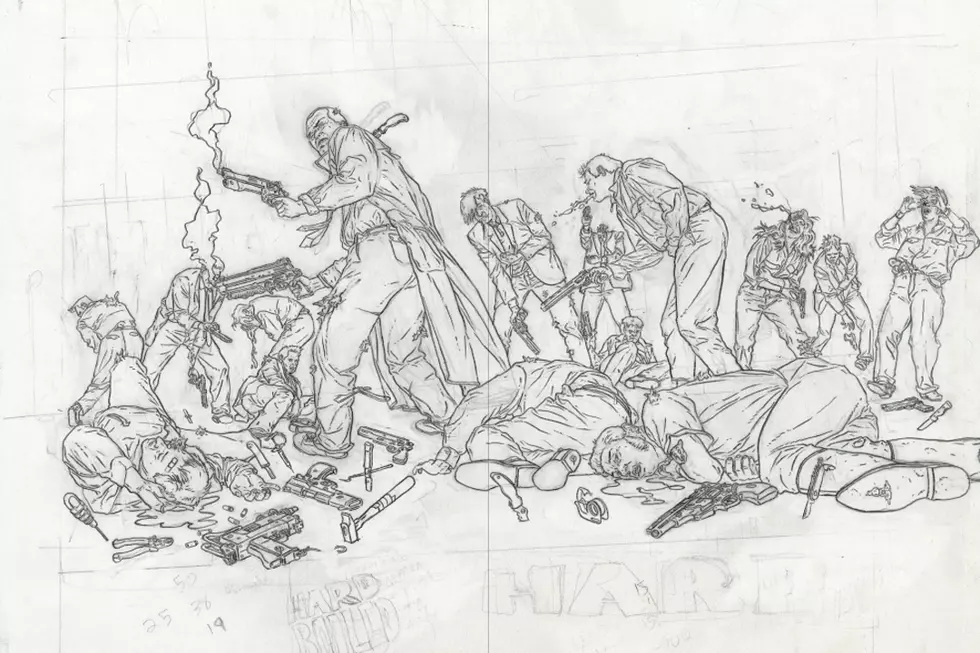![Geof Darrow, The Return Of Big Guy & Rusty The Boy Robot, And American Apathy [Review]](http://townsquare.media/site/622/files/2014/09/Untitled-14.jpg?w=980&q=75)
Geof Darrow, The Return Of Big Guy & Rusty The Boy Robot, And American Apathy [Review]
The newly relaunched Dark Horse Presents saw Geof Darrow make a welcome return to the pages of the anthology, with a new Big Guy and Rusty the Boy Robot story. Missing was Darrow's collaborator on the original 1995 comic, Frank Miller; in an interview prior to the release of the new short story, Darrow said he'd talked to Miller and hoped he would still come on board to write some dialogue, but it didn't read as overly convincing, so it wasn't a surprise to see him listed as the sole author come release time. Needless to say, a Miller-less Big Guy makes for a very different reading experience.
Miller and Darrow's original Big Guy and Rusty series saw Japan attacked by the incarnation of ultimate evil, manifest as a vast dinosaur/dragon creature, infecting the populace with chaos and fear, causing them to mutate into beasts as it rampaged, whilst delivering typical Miller-esqe bombastic polemic. After the Japanese military fail to stop it, they send out their secret weapon: a small, highly intelligent, perfectly designed, polite, metal Pinocchio of a robot called Rusty, who proves equally ineffective. The Japanese turn to the Americans for help, who deploy their own, humongous robot -- named Big Guy, no less-- who ultimately saves the day.
The original's 'American might and superiority over Japanese ineffectual ditheriness' concept, the names ('Rusty:' weak, incapable, 'Big Guy:' reliable, powerful, gets the job done), and the portrayals do not read well, and are so obvious, so embarrassingly shaky and superficial a thing, that there are those who'd argue the comic was satire (you know how that works?). If it sounds light on premise and intricacy, that's because it is -- robot clocks monsters, suspect ideology, with some nods to toy/kaiju/ mech culture thrown in; it's saving grace, the reason you were there and stayed, was Darrow's art: fine-lined, tight and knotty, beautiful detail bestowed in every nook and cranny.
Winding forward to present day, I'm sort of intrigued by Darrow currently as a writer. He returned to comics last year after a considerable hiatus with a new dubiously-met four-issue run of his Shaolin Cowboy comic, and here he employs the same unconventional, minimally worded, reverse paint-by-numbers narrative. It's more bare-bones foundation: Big Guy and Rusty are called out to take care of a creature who's appeared to terrorize some beach-side resort. Big Guy, the good lug soldier gets to work punching, focusing on the job he's been given, while Rusty the polite, ridiculous official hovers around delivering a long-winded, wordy, safety and instructions speech (the text size for Rusty's speech bubbles gets so small in a mirror of his useless droning, that even the reader gives up) to oblivious, dis-interested onlookers. That's pretty much the, um, story.
Darrow often draws scenes in 'real time' eschewing the time jump abilities offered by the space between panels (Hard Boiled loops continuously) the repetition of images -- the effect of which means very little changes from panel to panel, as only seconds, perhaps minutes, have passed. The monotony of the repetition of similar images leads the gaze to an aspect for which Darrow's well-known: detail. It's Darrow almost staring you down -- how long can you look at this beautiful image, minutely altered, before you look away, or get bored: a paradoxical art of having so much on the page yet doing very little with it -- forcing the reader to interact more, put more of themselves into the comic and what it may or may not mean, forcing interaction by means of purported authorial ambivalence, the lack of engagement provoking a reaction -- even if it's putting the comic down.
Darrow's spoken before about how he likes to incorporate layers of interest to background and minutiae (look at that cover, for instance, and you'll see all the dogs are wearing little t-shirts under a 'no parking, dogs only' signpost, or the 'international boner society' sticker on one of the car bumpers). Here, the reader is coerced into becoming one of the bystanders. To begin with, our position is the same as theirs: facing the action, watching Big Guy and Rusty while our fellow bystanders leisurely record the monstrous showdown. But then, as quickly as they're bored, we move to look around us, at others on the beach: bodies and bodies, eating, dancing, the sand strewn with bottles and cans of beer and pop, pizza boxes, and guns. So many guns. A drawstring bag with two guns sticking out, a holster casually looped around the arm of a deck-chair, a naked gun on a towel beside its owner, a spilled tote reveals ye another weapon, a large ice-bucket holds an array of bottles and fire-arms.
You may not even notice the guns straightaway, they blend in with the sand and litter and people, but once you do, the contrast between the passivity of the apathetic (mostly white) people and the connotations of the weapons are sinister. At a push, this crowd are zombies of another kind: they watch, they record, they eat, they consume, they quickly get bored, none of them utter a word. Yet, in his own way (even if he intended it as such), Darrow fails as much as Miller to make any kind of nuanced political statement beyond a comment on social numbing, guns are bad (maybe), and an apparent disdain for tattoos.
I'm not going to pretend this, or the new Shaolin Cowboy (where the monk essentially silently, mind-numbingly fights hoards of zombies over four issues) is anything other than very thin, yet at the same time I give Darrow a pass of sorts, because a) he can draw like a caged beast (you can't accuse him of not putting in the effort on that front) -- and that makes up for a lot, and b) I admire the man's chutzpah: the sheer gall of turning in issue after issue, panel after panel, of the same thing. There's pretentiousness, and attributing meaning -- and I never rule out things being too smart for me to comprehend -- but I don't think it's that Darrow doesn't care; he's just doing what he wants to the Nth and I respect the sincerity of that, and the spirit in which it's offered.
More From ComicsAlliance



![Ashley Wood is Having Fun With Nostalgia at ThreeA [SDCC 2016]](http://townsquare.media/site/622/files/2016/07/IMG_0396.jpg?w=980&q=75)





